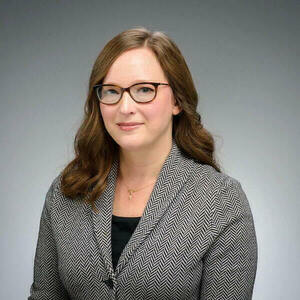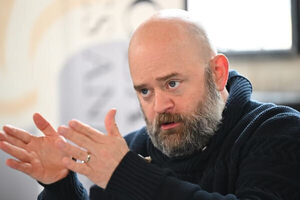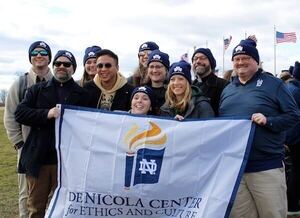Jennifer Newsome Martin to succeed O. Carter Snead as director of de Nicola Center for Ethics and Culture

I.A. O'Shaughnessy Dean of Arts and Letters Sarah Mustillo has appointed Notre Dame theologian Jennifer Newsome Martin to be the next director of the de Nicola Center for Ethics and Culture. She will succeed O. Carter Snead, Charles E. Rice Professor of Law, who will conclude 12 years of service in this role on June 30, 2024.
“Serving as director of the de Nicola Center has been one of the greatest professional privileges and blessings of my life,” Snead said. “I can think of no one better to lead the Center into the future than my friend and dCEC faculty fellow Jenny Martin. She has a heart for the dCEC’s mission in all its dimensions, is a brilliant scholar, a beloved teacher and a dynamic and inspiring leader. Simply put, Jenny is one of the most exciting Catholic intellectuals in academia today.”
Snead was appointed director of the Center for Ethics and Culture in 2012, taking over from founding director David Solomon, professor emeritus of philosophy at Notre Dame. Renamed the de Nicola Center for Ethics and Culture following a $10 million endowment gift from the de Nicola family in 2019, the dCEC has become the world’s foremost center for interdisciplinary research, teaching and discourse within the Catholic moral and intellectual tradition.
“Professor Snead’s efforts on behalf of the de Nicola Center over the last 12 years have helped deepen the conversation on campus about questions of lasting import and have raised Notre Dame’s profile as the place for serious discussion and research rooted in the Catholic tradition,” said Dean Mustillo. “What’s more, no one is better suited to expand and carry forward that vital mission than Professor Martin. I look forward to continuing to work closely with Jenny and the de Nicola Center to project the University’s important voice in the public square in the years to come.”
Professor Snead will remain involved with the dCEC’s nascent interdisciplinary bioethics initiative, which will include teaching, research, service and public engagement.
Twelve Years of Unprecedented Growth

Since the beginning of Snead’s directorship in 2012, the de Nicola Center has launched or expanded a number of initiatives that sought to deepen conversation surrounding the most vexed questions of ethics, culture, and public policy today. Its annual Fall Conference — the largest interdisciplinary academic event at Notre Dame — now routinely draws more than 1,000 attendees and 150 speakers from around the world, including Nobel Laureates, Academy Award winners, scientists, theologians, philosophers, artists, poets, journalists, legal scholars, social scientists and other thought leaders for three days of conversation as participants grapple with broad questions of enduring import, including poverty, beauty, good and evil, friendship and creation.
Recently, the de Nicola Center has partnered with the Boundaries of Humanity project at Stanford University, with the support of the John Templeton Foundation, to broaden and continue these conversations with other top institutions around the world.
The de Nicola Center has also revised and expanded four book series with University of Notre Dame Press, publishing 28 award-winning volumes since 2016, including the previously untranslated and unpublished works of Aleksandr Solzhenitsyn by special arrangement with the Solzhenitsyn family. Alongside its publications, the de Nicola Center has hosted an array of renowned senior visiting scholars who have conducted important writing and research during their residency with the Center, including John Keown (Georgetown), James Hankins (Harvard) and Zena Hitz (St. John’s College).
The de Nicola Center continues to support academic life on campus through its Sorin Fellows student formation program, which has grown from 17 students in 2014 to an active cohort of close to 600 undergraduate, graduate and professional students today who receive mentoring, dedicated academic programming, research support, pilgrimage opportunities and funded summer internships all over the world. Through the generosity of its benefactors, the de Nicola Center also created two endowed fellowships, the Polking and Solomon fellowships, offering financial support, mentorship and guidance for excellent law and graduate students who are passionate about the Center’s mission.

For the past 12 years, the de Nicola Center has enthusiastically embraced its role as the key operational arm of Notre Dame’s institutional commitment to building a culture of life for every member of the human family, born and unborn. During this period, the Notre Dame Evangelium Vitae Medal has become the most important award for heroes of the pro-life movement; the Vita Institute has grown into the most sophisticated and effective interdisciplinary educational program for leaders working to build a culture of life around the world; and Notre Dame’s student contingent attending the annual March for Life in Washington, D.C., became the largest of any university in America.
Following the landmark 2022 Supreme Court decision in Dobbs v. Jackson Women’s Health Organization, the de Nicola Center emerged as the most important resource in academia and the global public square for illuminating the background, meaning and import of the decision. Most recently, media commentators and public policy experts from across the ideological spectrum have widely praised the de Nicola Center’s nascent post–Roe “Women and Children’s First Initiative,” an interdisciplinary program of teaching, research, service and public engagement aimed at building a world in which mothers, babies and families are welcomed, protected and supported throughout life’s journey.
In addition to its scholarly research and student programming, the de Nicola Center has sought to support the University’s goal of attracting and retaining elite faculty in any field who are passionate about Notre Dame’s distinctive mission. Under its mission stewardship initiative, the de Nicola Center raised funds to create seven new professorships at the University — four entry-level, one lateral and two university chairs. In addition, the de Nicola Center funds two outstanding faculty members in the College of Science and has provided additional funding to support the salary and benefits for three faculty members in the College of Arts and Letters.
The de Nicola Center currently rests on the strongest financial foundation in its history. Since 2012, due to new gifts from its large and diverse array of generous benefactors, the endowed funds associated with the Center have increased twelvefold, allowing the dCEC to grow and project its impact on a scale never before possible.
The de Nicola Center has also been a unique countercultural beacon in higher academia and the global public square for its unfailing commitment to exploring the full spectrum of the Catholic tradition, engaging in civil discourse across disciplinary and normative divides, while avoiding the ideological balkanization that has bedeviled many academic centers and institutes, including at Catholic universities.
Welcoming Professor Martin
Martin — a Notre Dame associate professor with joint appointments in both the Program of Liberal Studies and the Department of Theology, as well as a longtime faculty fellow of the de Nicola Center — expressed her gratitude for the contributions of the de Nicola Center to the life of the University over more than 20 years, as well as her enthusiasm to continue building upon its important work.
“Thanks to the extraordinary leadership of Professor Snead, and Professor Solomon before him, the de Nicola Center is today in the unique position of engaging and representing Catholic identity and culture not only within the larger University but also within the global public sphere,” Martin said. “Building on that strong foundation, I believe the Center can continue its mission of being a constructive witness to the enormous cultural, intellectual and moral riches of the Catholic intellectual tradition, and to present such things compellingly, winsomely and generously, carrying within themselves their own credibility and attractiveness.”
Professor Martin’s research interests and expertise span 19th- and 20th-century Roman Catholic and Eastern Orthodox thought, trinitarian theology, theological aesthetics, religion and literature, French feminism, ressourcement theology and the nature of religious tradition. Her first book, “Hans Urs von Balthasar and the Critical Appropriation of Russian Religious Thought” (University of Notre Dame Press, 2015), was one of 10 winners internationally of the 2017 Manfred Lautenschlaeger Award for Theological Promise.
“Professor Martin has a clear and demonstrated commitment to preserving, sustaining and advancing the distinctive Catholic mission and character of the University of Notre Dame and to the mission, character and work of the de Nicola Center,” Dean Mustillo said. “I have every confidence that she will continue the great work of the de Nicola Center and elevate it to even higher levels of excellence and impact.”
Originally published by at ethicscenter.nd.edu on January 23, 2024.
Latest Faith
- de Nicola Center presents 24th annual Fall Conference, ‘Ever Ancient, Ever New: On Catholic Imagination’More than 1,200 scholars, students and guests from around the world will attend the de Nicola Center for Ethics and Culture’s 24th annual Fall Conference, “Ever Ancient, Ever New: On Catholic Imagination.” The conference features more than 175 papers, panels and performances across three days of conversation on the enduring and inexhaustible nature of the Catholic imagination.
- Sister Draru Mary Cecilia, LSMIG, receives Notre Dame Award for Outstanding Contributions to Catholic EducationThe Notre Dame Award for Outstanding Contributions to Catholic Education, awarded by the Alliance for Catholic Education, honors those who have made generous, lifetime commitments to sustain and strengthen Catholic schools. As executive director of the African Sisters Education Collaborative, Sister Draru oversees the education for Catholic sisters in 10 African countries. She has spent much of her life working to expand women’s education in Uganda and elsewhere on the African continent.
- Notre Dame Forum to present ‘Fr. TED Talks’ on Catholic social tradition, featuring President Rev. Robert A. Dowd, C.S.C., and Dr. Jim O’ConnellHonoring the legacy of legendary University of Notre Dame President Rev. Theodore M. Hesburgh, C.S.C., the 2024-25 Notre Dame Forum will host “Fr. TED Talks: Ideas from the Catholic Social Tradition That We Find Inspiring,” a two-night festival on Oct. 28 and 29.
- Notre Dame receives Lilly Endowment grant to support development of faith-based frameworks for AI ethicsThe University of Notre Dame has been awarded a $539,000 grant from Lilly Endowment Inc. to support Faith-Based Frameworks for AI Ethics, a one-year planning project that will engage and build a network of leaders in higher education, technology and a diverse array of faith-based communities focused on developing faith-based ethical frameworks and applying them to emerging debates around artificial general intelligence.
- de Nicola Center to award 2025 Evangelium Vitae Medal to Anthony and Phyllis LauingerThe de Nicola Center for Ethics and Culture will award the 2025 Notre Dame Evangelium Vitae Medal — awarded to heroes of the pro-life movement — to Anthony J. and Phyllis W. Lauinger of Tulsa, Oklahoma, at a Mass and dinner on May 3, 2025, at the University of Notre Dame.
- Notre Dame theologian to receive 2024 Ratzinger Prize from VaticanCyril O’Regan, the Catherine F. Huisking Professor of Theology at the University of Notre Dame, has been selected to receive the 2024 Ratzinger Prize in Theology, widely regarded as the most prestigious award in the field. Pietro Parolin, the Vatican’s secretary of state, will present the award to O’Regan and to sculptor Etsurō Sotoo during a ceremony at the Apostolic Palace in Vatican City on Nov. 22. Both winners will also have an audience with Pope Francis earlier that day.













